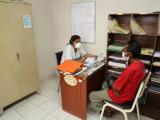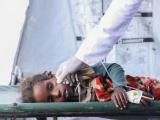Nov 7, 2011
FDA announces recalls of olives, oysters after illnesses reported
The US Food and Drug Administration (FDA) on Nov 4 announced recalls of stuffed olives and shucked oysters after reports of botulism and norovirus illness, respectively, according to FDA press releases. In the first release, the FDA warned people not to eat Bio Gaudiano brand Organic Olives Stuffed with Almonds, saying they were linked to two botulism cases in Finland that required hospitalization. No cases have been reported in the United States, but US distributor Pure Italian LLC of Watertown, Mass., in conjunction with manufacturer Bio Gaudiano of Italy, is voluntarily recalling all sizes and lots of the olives. European health authorities have found samples of the product to contain botulinum toxin, the FDA said. Pure Italian LLC said it had distributed the olives in Massachusetts only. Botulism attacks the nervous system and, in its severe forms, can cause respiratory failure and death.
Nov 4 FDA press release on olives
In the oyster recall, the FDA warned consumers not to eat certain ASSI Brand oysters from South Korea after three norovirus cases in Washington state were linked to the product. The shucked oysters are sold in 3-pound bags labeled ASSI Brand "INDIVIDUALLY QUICK FROZEN OYSTER" with a "Better if Used By" date of Feb 23, 2013. Each bag identifies Central Fisheries Co. Ltd. as the packer and Korean Farms of Santa Fe Springs, Calif., as the distributor. The oysters were shipped in boxes of 10 bags each with the lot number C-110223 on each box, along with a shucked date of Feb 24, 2011. The product was shipped to Washington, California, Texas, Colorado, Arizona, Idaho, and Utah. The oysters, which were eaten by three Washington restaurant patrons who became ill, were tested by the FDA and found positive for norovirus genotypes I and II, according to the release. No hospitalizations or deaths were reported. Consumers who bought the oysters are advised to throw them out.
Nov 4 FDA press release on oysters
Study suggests economic downturn could affect TB control
Researchers from the US Centers for Disease Control and Prevention (CDC) today reported a sharp drop in tuberculosis (TB) cases in 2009 that they hypothesize could be related to the nation's economic downturn, rather than changes in reporting or disease transmission. Their analysis of TB patterns from Jan 2000 through Dec 2009 appears in BMC Public Health. They also looked at TB control program data, monthly prescription claims, and genotyping data of TB cases, which have declined an average of 3.8% each year since 2000. However, in 2009 they reported an 11.4% decrease. The decline was steeper among immigrants and disadvantaged groups, such as homeless people and substance abusers. Multiple data sources documented the decreases the group saw in their surveillance analysis. They didn't identify any changes in TB control methods that accounted for the sharp fall in cases. Factors related to the economic recession, such as decreased immigration and delayed access to medical care, could be driving the decline, the researchers suggested, warning that cases might increase when the economy recovers and immigration levels increase. "Future cases may be more advanced, more infectious, and more difficult to cure," the authors wrote, suggesting that public health programs address TB and disparities in healthcare access.
Nov 7 BMC Public Health abstract
Nov 7 EurekAlert press release




















